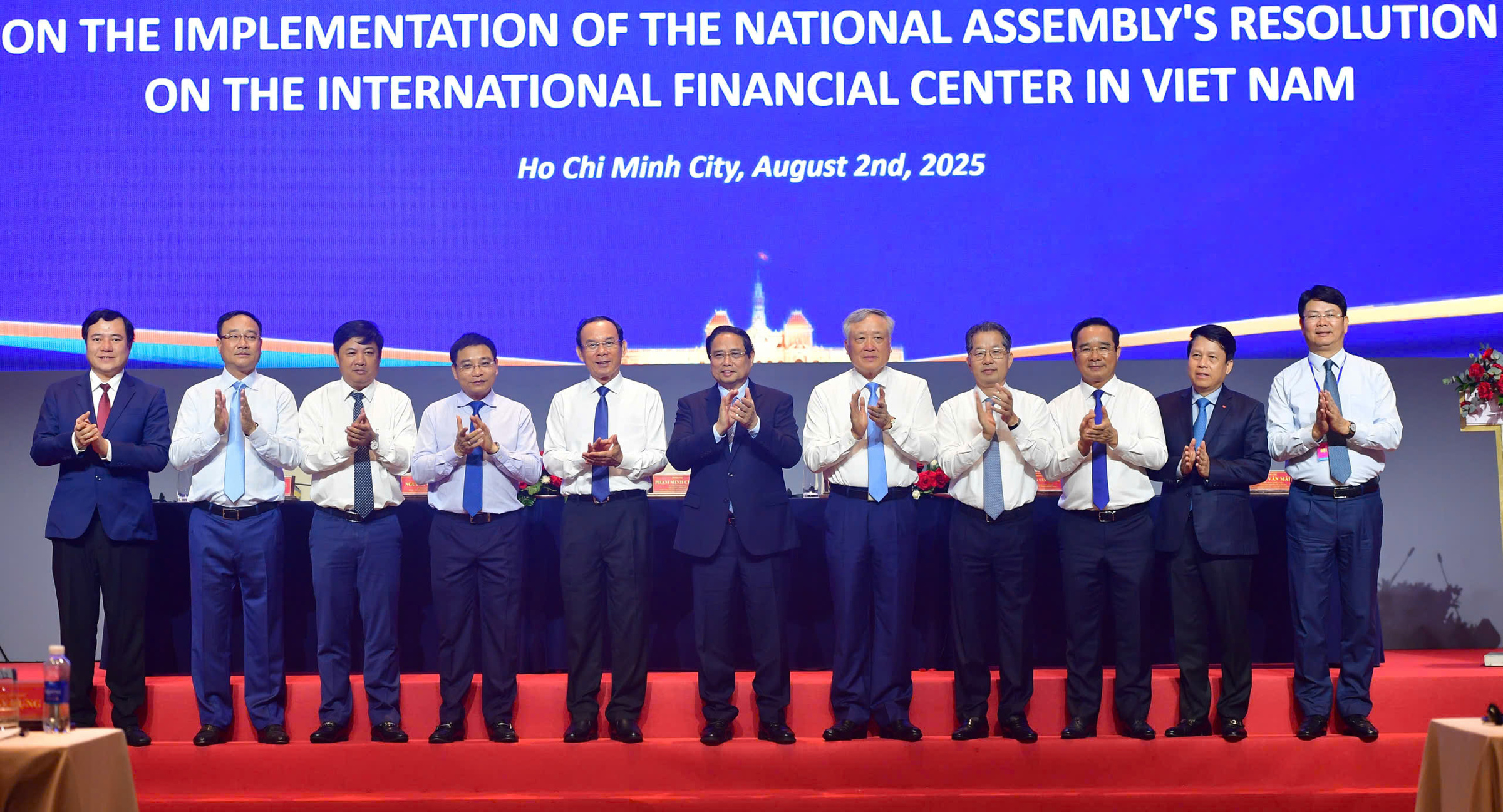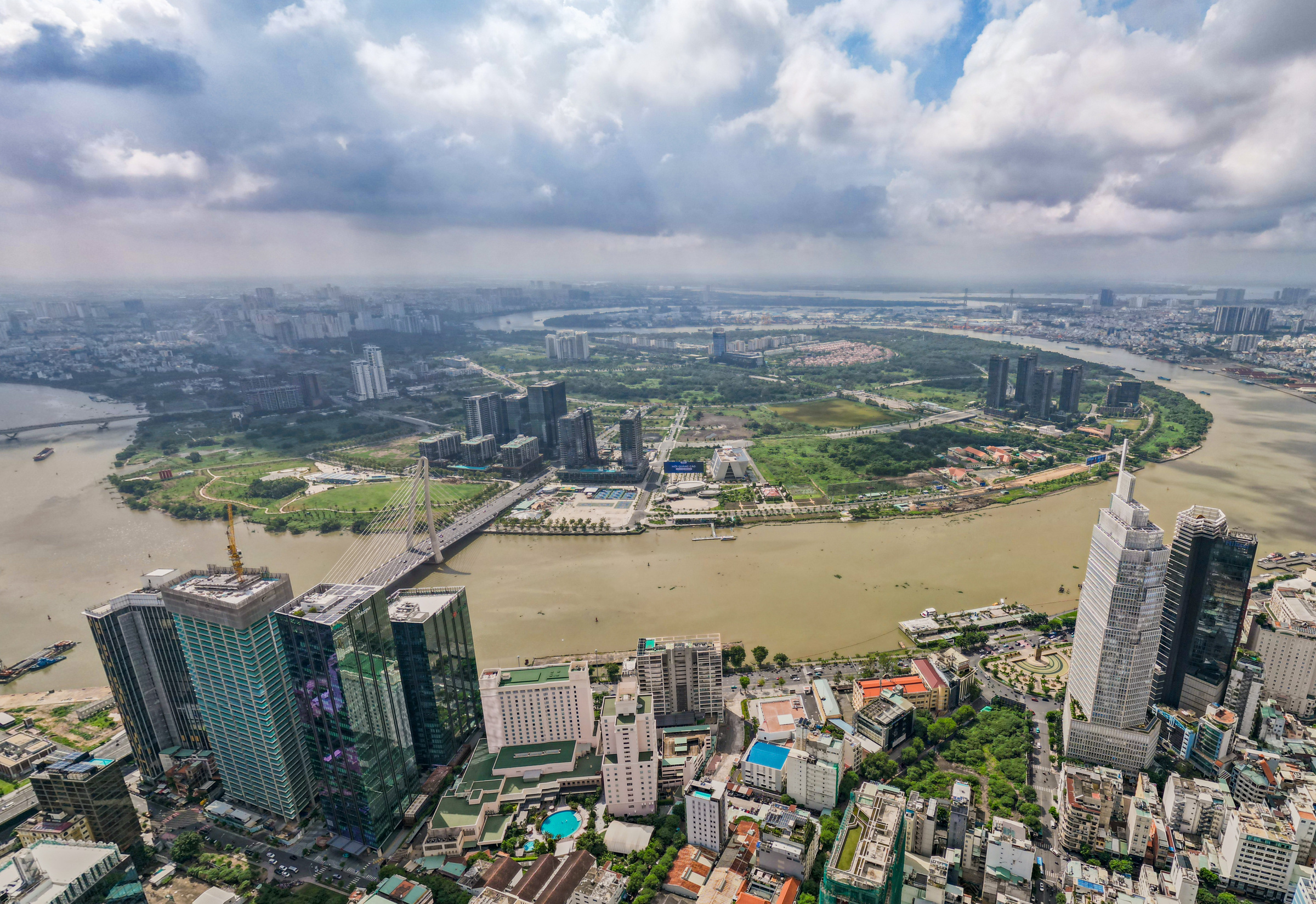This is part of the Action Plan for the Development of International Financial Centers in Vietnam, recently signed and issued by Prime Minister Pham Minh Chinh.
The decision was announced by Minister of Finance Nguyen Van Thang on Tuesday morning, 2/8, at a conference in Ho Chi Minh City discussing the National Assembly's resolution on international financial centers in Vietnam.
 |
Members of the Steering Committee for the implementation of the Financial Center in Vietnam launched on Tuesday morning, 2/8, in Ho Chi Minh City. Photo: Thanh Tung |
Members of the Steering Committee for the implementation of the Financial Center in Vietnam launched on Tuesday morning, 2/8, in Ho Chi Minh City. Photo: Thanh Tung
The government aims to build a modern financial ecosystem by promoting new markets (commodity exchanges, carbon markets, etc.), high-tech financial services (fintech, digital banking), and a skilled workforce. The initial goal is to establish an ecosystem of support services, such as legal, auditing, and technology services, meeting international standards in Ho Chi Minh City and Da Nang this year.
Authorities will also finalize a specific legal framework for the international financial centers, ensuring a transparent and systematic approach. Special mechanisms and policies will attract capital, technology, modern management methods, and a highly qualified workforce, while safeguarding financial and monetary security. By the end of 2025, Ho Chi Minh City and Da Nang will have developed the necessary infrastructure and services, including transportation, telecommunications, and logistics, to support the operation of the international financial centers.
To achieve these goals, the government will complete the specialized legal framework, consolidate the administrative apparatus, and accelerate the development of strategic infrastructure in Ho Chi Minh City (Saigon, Ben Thanh, and Thu Thiem wards) and Da Nang by the end of the year. This includes digital infrastructure, 5G coverage, and a blockchain platform for testing digital assets and NFTs.
 |
Downtown Ho Chi Minh City and the Thu Thiem peninsula area, where the International Financial Center is being developed in Ho Chi Minh City, July 2025. Photo: Quynh Tran |
Downtown Ho Chi Minh City and the Thu Thiem peninsula area, where the International Financial Center is being developed in Ho Chi Minh City, July 2025. Photo: Quynh Tran
The government also aims to develop a high-quality workforce, complete the innovation ecosystem, and ensure a favorable living and business environment for investors.
Local authorities and ministries will study international financial center models and establish coordination and monitoring mechanisms throughout the implementation process.
The prime minister has requested that ministries and the Ho Chi Minh City and Da Nang authorities develop detailed plans to ensure timely and quality implementation, addressing any arising issues promptly.
The Steering Committee for the implementation of the Financial Center in Vietnam was also launched on Tuesday morning. Prime Minister Pham Minh Chinh heads the committee. The five deputy heads include Permanent Deputy Prime Minister Nguyen Hoa Binh, Ho Chi Minh City Party Secretary Nguyen Van Nen, Finance Minister Nguyen Van Thang, State Bank Governor Nguyen Thi Hong, and Da Nang City Party Secretary Nguyen Van Quang, along with members who are leaders of ministries and branches.
On 27/6, the National Assembly passed a resolution on the development of international financial centers in Vietnam with over 93.5% approval. The resolution, effective from 1/9, directs the establishment of financial centers in Ho Chi Minh City and Da Nang with a unified management mechanism but with specialized products developed according to each locality's strengths.
Ho Chi Minh City will focus on capital markets, banking, currency, fintech sandboxes, and specialized exchanges. Da Nang will develop green finance, financial technology, digital services, and the controlled testing of digital assets and currencies, attracting investment funds.
The resolution also stipulates various preferential policies on taxes, land, and labor. Priority projects can lease land for up to 70 years and are exempt from personal income tax for foreigners until 2030. Investing businesses will enjoy a 10% corporate income tax rate for 30 years, with a maximum exemption of 4 years and a 50% reduction for the next 9 years. The dispute resolution mechanism has been expanded to allow the choice of domestic and international arbitration.
Both cities have prepared infrastructure, human resources, and promoted investment with strategic partners to implement the international financial centers.
Le Tuyet












